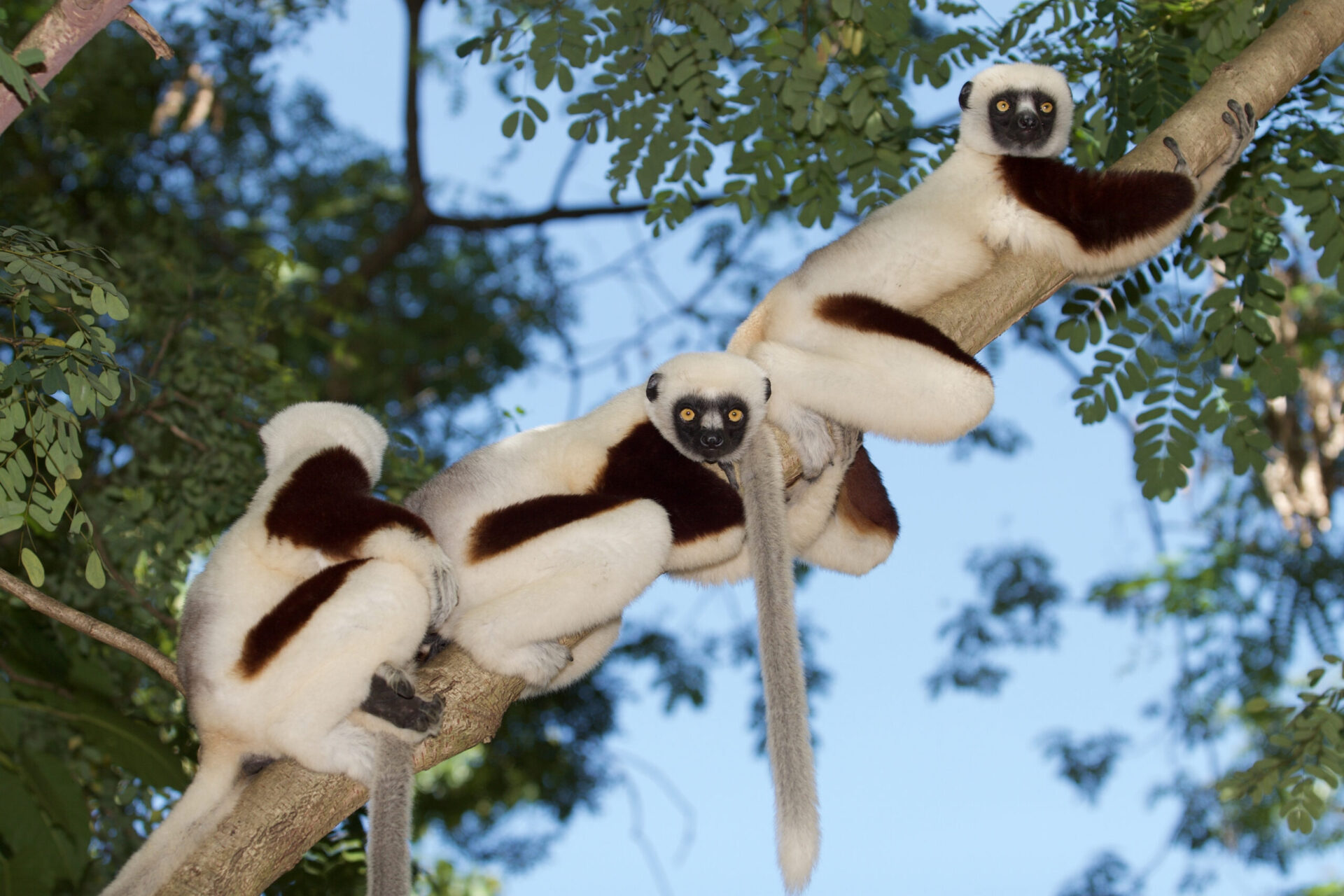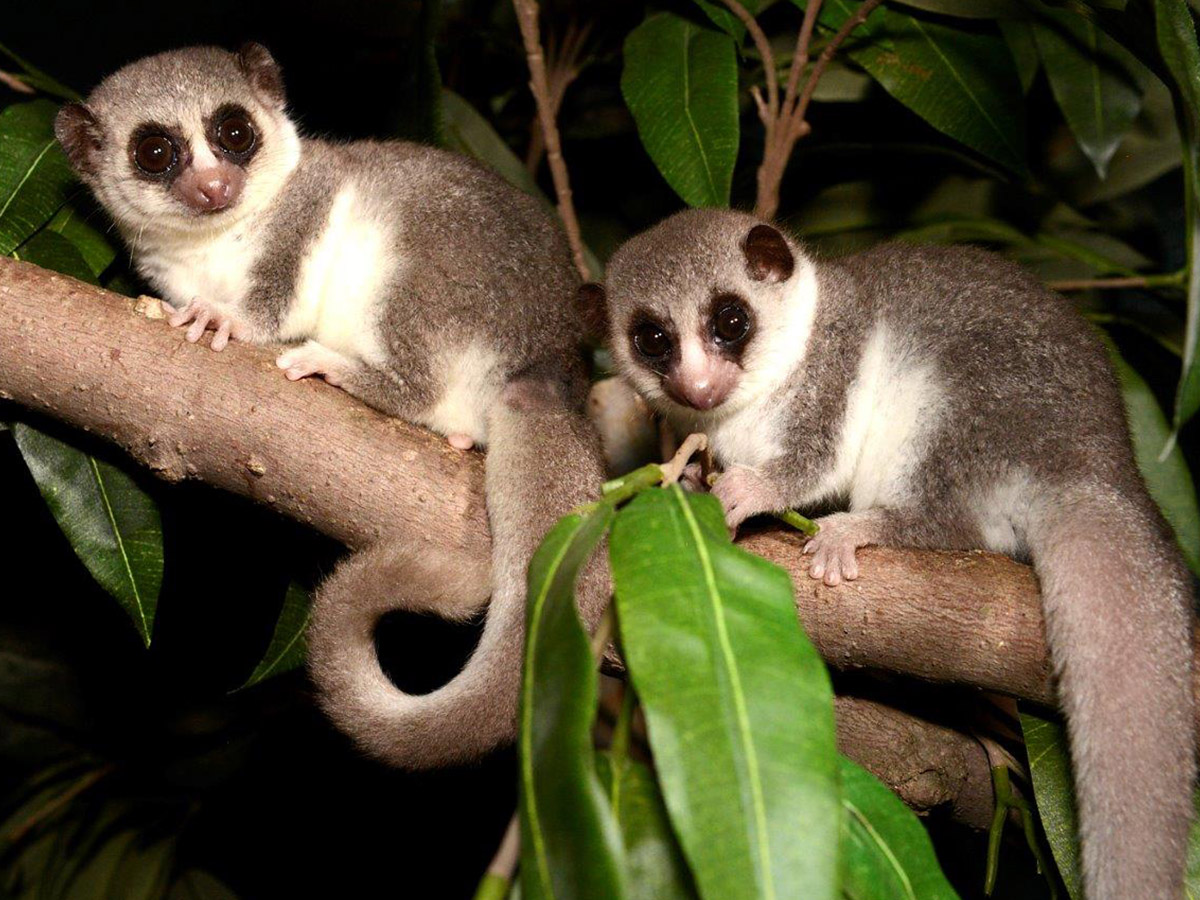Non-invasive Research: 2020 Impact Report

By studying wild lemurs in Madagascar and their peers at the DLC, we have the potential to answer age-old and emerging questions across scientific disciplines. Lemur research can simultaneously inform conservation and husbandry strategies, train the next generation of American and Malagasy scientists, inspire curiosity and engage the general public, and promote international collaborations rooted in teamwork. Pictured: A trio of Coquerel’s sifakas in Madagascar. Image (C) T. Steffens.
It goes without saying that 2020 was an unusual year, but the DLC is powering on, adapting, and recognizing how truly fortunate we have been during such a tumultuous time. Studies have shown that lemurs are likely susceptible to COVID-19, thus the DLC enacted strict safety protocols to minimize risk of transmission. Due to the exceptional care and responsibility shown by our staff, the health of our staff and animals has not, to date, been affected.
Despite a four-month shut-down in 2020 and subsequent limitations in how the DLC was able to accommodate research during the pandemic, the DLC’s research program continued to thrive.
Federal funding: In June 2020, the DLC was notified by the National Science Foundation (NSF) that our three-year colony support grant was awarded. The overarching aim of the project is to enhance strategically the value of the DLC as a living laboratory through a combined focus on colony viability, research, database management, and outreach in Madagascar.
Scientific outreach: The 2019 initiative to strengthen our research program by hiring DLC scientists Dr. Marina Blanco (hibernation in dwarf lemurs) and Dr. Lydia Greene (microbiome science) has proven to be invaluable, not only in terms of the scientific applications of their research, but also in scientific outreach. During the course of the pandemic, Drs. Blanco and Greene developed and/or participated in various virtual platforms and activities to keep the public engaged and excited about our research efforts in Madagascar and at the DLC.

The Duke Lemur Center studies dwarf lemurs under different natural environments in Madagascar, as well as under more controlled conditions at the DLC. Whereas we expect research from Madagascar to shed light into the long-term effect of habitat disturbance, such as forest fragmentation, on dwarf lemurs’ ability to hibernate and rely on alternative food sources, research at the DLC can elucidate the underlying mechanisms of hibernation and how different conditions can modulate its expression.
Malagasy research station: Thanks to a generous gift by Bob and Sue Knox, the DLC will break ground on a new field station in northern Madagascar in 2021. The field station will provide the necessary infrastructure to advance our non-invasive research into the mechanisms and strategies of successful hibernation in certain species of lemurs. It will also provide students from around the world the opportunity to work side-by-side with DLC staff scientists Dr. Marina Blanco and Dr. Lydia Greene to promote a better understanding of lemurs and ultimately help promote their conservation and protection from extinction.
Malagasy veterinary/research internship: The DLC hosted a combined-focus veterinary and research internship in spring 2020 for Malagasy veterinarian Dr. Elodi Rambeloson. Rambeloson runs a research program in Anjajavy, Madagascar, and he has agreed to oversee animal health and veterinary care at the aforementioned DLC field station. Through the three-month internship, Dr. Rambeloson received continued training in veterinary medicine, as well as empirical and applied research.
Support for Malagasy students: Blanco and Greene raised $3,000 from friends and family to create four $750 scholarships to help Malagasy students get their research published. The grant will be awarded to two students at a time so that Lydia and Marina can mentor them as they work their way to publication.
Diversity in research: If there are any silver linings to 2020, it is a greater awareness of the need for diversity and equity, and of the reach provided by a more virtual world. Despite our summer internship program being cancelled for 2020 and 2021, we have reached new audiences and are developing internship opportunities that are not limited by factors that bias traditional internship opportunities away from under-represented communities: flexibility in time, transportation, and financial constraints.

